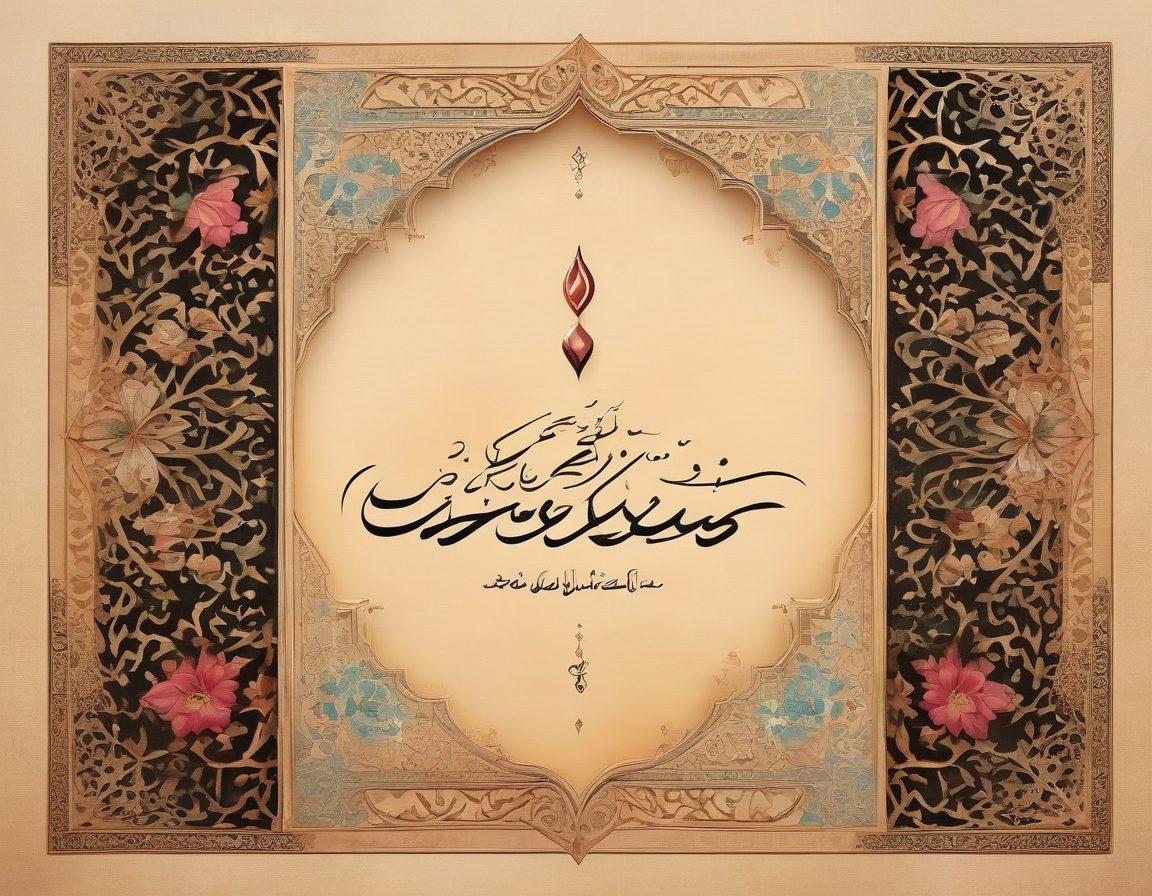Exploring the Language of Love: Mastering Arabic Expressions of Affection and Romance
When it comes to matters of the heart, every culture has its unique way of expressing affection and romance. The Arabic language, rich in history and dialectical variations, has an abundance of phrases that encapsulate adoration in deeply meaningful ways. How can understanding these linguistic nuances enhance our connections with others? By delving into Arabic linguistics and exploring dialectical differences, we can uncover the romantic expressions that bring us closer to the beauty of this timeless language. After all, language is a bridge, and what better way to cross it than through the warmth of fondness?
Imagine sitting with a loved one, the soft glow of twilight surrounding you, and greeting them with the heartfelt phrase 'أحبك' (aḥibbuka for males, aḥibbuki for females), which directly translates to 'I love you.' This simple yet profound expression is just one of the many jewels embedded within the Arabic language’s vast lexicon of romance. As you study Arabic, you'll begin to appreciate how Arabic syntax and grammar guidelines cater to intimate emotional exchanges, allowing speakers to convey their emotions with precision and warmth. The beauty of Arabic lies not only in its words but in how intricately these expressions weave together the fabric of attachment and connection.
But what does it mean to truly master Arabic expressions of affection? It's about more than just learning vocabulary or practicing Arabic conversation. It involves understanding the cultural contexts in which these words are used. For instance, in Egypt, you might hear the phrase 'أنا معاك دائما' (ana ma'ak daiman - 'I am always with you'), which hints at loyalty and commitment, essential aspects in many relationships. On the other hand, a phrase like 'قلبي لك' (qalbi lak - 'My heart is yours') used in the Gulf region adds a romantic flair that is undeniably enchanting. How do these cultural aspects of Arabic flavor the way love is expressed?
Engaging in the study of Arabic linguistics not only enhances your language proficiency but also nurtures your ability to communicate romance creatively. Among the intricacies of Arabic phonetics, there’s an elegance in how tones and inflections can change the entire meaning of an expression. This concept opens doors to expressing nuanced feelings and emotions, making your interactions richer. Whether you're aiming for a flirtatious compliment or a heartfelt declaration of love, fluency in these romantic expressions can transform your connections. Are we not all dreaming of being the romantic hero or heroine in our unique love story?
So, how can you enhance your vocabulary and acquire the language skills necessary for this romantic exploration? Start by immersing yourself in Arabic media, such as poetry, songs, and films, where expressions of love take center stage. Practice using these phrases in your conversations and pay attention to the rhythm of words, as rhythm is the heartbeat of language. Engaging actively with a community of Arabic speakers can ignite your passion for the language and deepen your appreciation for its cultural depth. Remember, every word carries attachment and fondness, waiting for you to unlock its potential in your own romance. The journey of discovering love in a new language is not merely about linguistic mastery, but about connecting hearts across cultures.
Enhancing Your Vocabulary: Mastering Affectionate Arabic Phrases for Everyday Conversations
Have you ever wanted to express your feelings in a language steeped in tradition, romance, and warmth? Arabic, a language of depth and beauty, provides countless expressions of affection that nurture connections with our loved ones. From the delicate whispers of adoration to the passionate declarations of fondness, mastering these affectionate Arabic phrases not only enhances your vocabulary but also enriches your Arabic conversations. Let’s dive into some enchanting expressions that can help you foster love and connection through the rhythmic melody of Arabic linguistics.
Imagine standing in a bustling market in a Middle Eastern city, surrounded by vibrant colors and the tantalizing scent of spices. As you browse the stalls, you overhear a couple exchanging sweet nothings in Arabic, their words wrapped in the warmth of romance. Wouldn’t you love to join that conversation? Words like 'حبيبي' (habibi) and 'قلبي' (qalbi) can transform any simple exchange into one filled with affection. Understanding these terms is just scratching the surface of Arabic syntax, where even the simplest phrase may carry deeper emotional weight. What’s your favorite way to express love?
Cultural aspects of Arabic play a significant role in language acquisition. By employing affectionate Arabic phrases, you're not only speaking a language but also embracing a culture that celebrates attachment and fondness. For example, saying 'أنت نجم حياتي' (anta najm hayati), which translates to 'You are the star of my life,' elevates everyday conversations and shows a high level of Arabic fluency. It’s these thoughtful phrases that open doors to deeper relationships and a profound sense of belonging.
As you study Arabic, consider this: How can the richness of affectionate vocabulary change your interactions? Take the time to master these expressions, and watch how your Arabic comprehension expands. Language skills go beyond grammar guidelines; they are about understanding emotions and nuances. Whether you’re engaging in a lively conversation or simply exchanging messages, using these affectionate terms can transform mundane dialogue into heartfelt exchanges.
By enhancing your vocabulary with these affectionate Arabic phrases, you'll become not just a speaker of the language but also a cultural ambassador. Embrace the romantic essence of Arabic with open arms. Incorporate phrases into your daily life—practice saying 'أحبك' (ahibbuka) or 'أشتاق إليك' (ashtaq ilayk) to convey your feelings effectively. With every word, you'll weave a tapestry of love and connection that honors the beauty of Arabic language rules. So, let’s embark on this journey of emotional expression in Arabic, where every phrase carries the power to ignite romance and strengthen bonds.
The Art of Arabic Romance: Grammar Guidelines and Phonetics to Elevate Your Language Skills
Have you ever wished to sweep someone off their feet with the eloquence of your words? Imagine weaving beautiful tales of affection and adoration, mirrored in the poetry of the Arabic language. Arabic is not just a means of communication; it's a dance of dialectical variations and intricate phonetical expressions that tell stories of romance and connection. In this journey through the art of Arabic romance, we'll explore grammar guidelines and phonetics that can help you elevate your language skills to new heights, making your attempts at love as smooth as a well-practiced Arabic conversation.
Arabic linguistics can initially seem daunting, with its complex syntax and rules. But within this complexity lies a beautifully intricate system where each word, phrase, and sound serves a purpose. Ask yourself: how many ways can you express fondness in just one language? In Arabic, there's a delightful range of expressions—from 'حب' (hub) meaning 'love' to 'عشق' (i'shq) which conveys a deeper passion and attachment. Understanding the nuances of these expressions not only deepens your appreciation of the Arabic language but also enriches your own experience of romance. So, how can mastering Arabic fluency transform your interactions with your loved ones?
Let’s dive into some of the grammar guidelines that can help when you're looking to express admiration or affection in Arabic. Understanding Arabic syntax—the arrangement of words and phrases to create meaning—allows you to construct sentences that resonate emotionally. Imagine telling someone, 'أنتِ زهرتي' (anti zahrati), which translates to 'You are my flower.' Applying the right Arabic language rules ensures that when you articulate affection, it carries the nuance and emotion intended. This is where language acquisition meets creativity, and you can begin to paint your emotions with words.
Phonetics also play an essential role in expressing romance in Arabic. It's not just about what you say but how you say it. The smooth flow of Arabic lends itself well to romantic expressions, making your vocal delivery equally important. Practice pronouncing phrases with the right intonation, rhythm, and emotion. Phrases like 'أنا أحبك' (ana uhibbuka) become more heartfelt when infused with the warmth of your voice. As you build your vocabulary enhancement efforts, remember: the better your pronunciation, the more likely you are to convey the desired emotion, further deepening that bond of affection with your listener.
Finally, immersing yourself in the cultural aspects of Arabic will not only enhance your language proficiency but will also add layers to your understanding of romance. Arabic-speaking cultures treasure love and relationships in literature, song, and art. Engaging with these elements will give you even more expressions to charm your beloved. So, as you embark on your journey to study Arabic, keep your heart open to new experiences and insights, for the path to mastering Arabic romance is as much about connection as it is about grammar and phonetics. Are you ready to put those skills into practice?


